|
|
|
Sort Order |
|
|
|
Items / Page
|
|
|
|
|
|
|
| Srl | Item |
| 1 |
ID:
120491
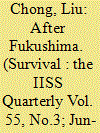

|
|
|
|
|
| Publication |
2013.
|
| Summary/Abstract |
The accident's impact on global expansion of nuclear power may be modest. China is among those who will continue to build and operate plants, and should be a leader in finding ways to do so safely and securely.
|
|
|
|
|
|
|
|
|
|
|
|
|
|
|
|
| 2 |
ID:
080846
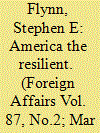

|
|
|
|
|
| Publication |
2008.
|
| Summary/Abstract |
A climate of fear and a sense of powerlessness caused by the threats of terrorism and natural disasters are undermining American ideals and fueling political demagoguery. Rebuilding the resilience of American society is the way to reverse this and respond to today's challenges.
|
|
|
|
|
|
|
|
|
|
|
|
|
|
|
|
| 3 |
ID:
138632


|
|
|
|
|
| Summary/Abstract |
This paper analyses the application of Bass’s diffusion model in forecasting the number of telecommunication services users in the event of natural disasters. Citizens’ behaviour has been modelled in the case of an emergency situation caused by an earthquake with high magnitude. We analysed the area of an administrative district in the south-west part of the Republic of Serbia which includes two cities and three municipalities. To control the consequences of natural disasters, a unit of the Army of Serbia with the required number of radio transceivers for establishing communication between the vulnerable population and rescuers with command staff at the observed territory has been dimensioned. Special emphasis is given to the provision of telecommunication support in the military assistance in a relief operation with civil authorities.
|
|
|
|
|
|
|
|
|
|
|
|
|
|
|
|
| 4 |
ID:
154128
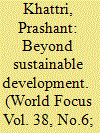

|
|
|
|
|
| Summary/Abstract |
The sustainable development framework came to the fore-front of the international policy making during the 1987 at the United Nations Commission on Environment and Development. This Commission which is popularly known as the Brundtland Commission established the need for sustainable development as against the dominant model of development that was not sensitive to the needs and conservation of the environment.
|
|
|
|
|
|
|
|
|
|
|
|
|
|
|
|
| 5 |
ID:
151778
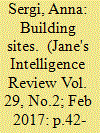

|
|
|
| 6 |
ID:
186808
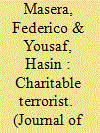

|
|
|
|
|
| Summary/Abstract |
Violent organizations are often providers of many social services in competition with the state. We provide evidence that these organizations use the provision of social services to gain support. This strategy is only effective when it fills the void left by a weak state. We show this by studying the provision of natural disaster relief by the Pakistani state and the Taliban. We first analyze the floods of 2010 that received an inadequate response from the government and show that support for the Taliban increased in the areas affected by the flood. These effects were concentrated in places where the Taliban likely provided help and where the state under-delivered. We then study the 2005 earthquake that instead received a swift government response and show that the Taliban lost support in the affected areas. Results cannot be explained by alternate mechanisms as anger against incumbents, political competition, electoral participation, and religiosity.
|
|
|
|
|
|
|
|
|
|
|
|
|
|
|
|
| 7 |
ID:
112189


|
|
|
|
|
| Publication |
2012.
|
| Summary/Abstract |
The main objective of this article is to highlight the challenge of maritime security in the region geographically bounded by the Indian Ocean. It studies the current status of maritime security in the region from both the traditional and non-traditional points of view. From the traditional security perspective, it examines the strategic interests of the major Indian Ocean players-the China-India competition and India-US relations in particular-in addition to the existing maritime disputes among the littoral states. The non-traditional security angle includes sea lines of communication (SLOCs), piracy, maritime terrorism, natural disasters and other crimes with a maritime dimension. There is a convergence of interests between both the littoral and user states for charting a maritime security cooperation mechanism which envisages a sharing of responsibilities in order to achieve the short-term and long-term maritime security of the Indian Ocean.
|
|
|
|
|
|
|
|
|
|
|
|
|
|
|
|
| 8 |
ID:
164296
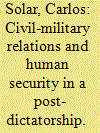

|
|
|
|
|
| Summary/Abstract |
This article explores current developments in Chile, where since the return to democracy in 1990, the elected authorities have reconfigured the nation’s military resources in favour of four action pillars: peacekeeping and international conflict management, landmine removal and gun disarmament, emergency and catastrophe response, and a concern for human, economic and social rights. Successive defence policies offer a valuable case study for exploring the trade-offs between security, traditional and non-traditional threat management and institutional capabilities. The article argues that human security policymaking is not free from undesired outcomes; specifically, regarding how to reconvene the role of the armed forces when conventional war seems a thing of the past. The paper focuses on the interagency policy implications and the challenges ahead for civilians and the military.
|
|
|
|
|
|
|
|
|
|
|
|
|
|
|
|
| 9 |
ID:
125908


|
|
|
|
|
| Publication |
2013.
|
| Summary/Abstract |
This article undertakes an empirical test of the proposition that natural disasters increase the risk of violent conflict. Climate change is expected to increase the risk of natural disasters, and India has been pointed to as being particularly at risk. State-level data from India for the period 1956-2002 are used to assess quantitatively whether climate-related natural disasters in India have contributed to increased rates of riots and politically motivated violence. The results indicate that disasters increase the risk of riots where literacy levels are high, and politically motivated violence where literacy levels are low. However, although statistically significant, the effect in both cases is so weak that it requires exceptional circumstances for disasters to have any substantially important impact.
|
|
|
|
|
|
|
|
|
|
|
|
|
|
|
|
| 10 |
ID:
153252
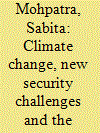

|
|
|
|
|
| Publication |
New Delhi, KW Publishers Pvt Ltd, 2017.
|
| Description |
xvi, 332p.hbk
|
| Standard Number |
9789386288226
|
|
|
|
|
|
|
|
|
|
|
|
Copies: C:1/I:0,R:0,Q:0
Circulation
| Accession# | Call# | Current Location | Status | Policy | Location |
| 059119 | 363.73/MOH 059119 | Main | On Shelf | General | |
|
|
|
|
| 11 |
ID:
174721
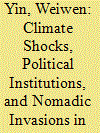

|
|
|
|
|
| Summary/Abstract |
While a large literature argues negative climate shocks can trigger conflicts, recent findings suggest moderate climatic conditions lead to war. This article proposes a conditional theory by incorporating political institution as a moderating variable. I argue that, under the impact of negative climate shocks, centralized societies can mobilize more resources for war, compared to decentralized societies. Thus, the former is more likely to resort to well-organized plundering to address the scarcity problem caused by detrimental climate shocks. Besides, centralized societies have little incentive to plunder when the climatic conditions are moderate, as they can collect taxes regularly through centralized institutions. A comparison between the more centralized Manchurian and the less centralized Mongols on their conflictual behavior serves as an empirical test. I find that temperature was negatively associated with the probability of Manchurian invasion after they embraced centralization but had a positive effect on the likelihood of Mongol invasion.
|
|
|
|
|
|
|
|
|
|
|
|
|
|
|
|
| 12 |
ID:
131644


|
|
|
|
|
| Publication |
2014.
|
| Summary/Abstract |
Mass incidents are inevitable in contemporary China and the first thing we should learn is to adopt a correct attitude towards them. Based on the three elements-activity, interaction and sentiment-of collective behaviors in 52 mass incidents in China during 2007-2011, we find that collective behaviors in mass incidents show significant differences in activity, interaction and sentiment. A grade evaluation method is proposed to estimate the evolution of collective behaviors in 52 mass incidents and to classify such behaviors into five grades. Then the influence factors on the three elements are analyzed using multiple linear regression. The regression results demonstrate that the impacts of location, casualties, inner-group relations, group scale and duration on the three elements are very significant. Finally, in the light of the regression results, some implications of collective behavior in mass incidents are proposed for the relevant authorities in responding to mass incidents.
|
|
|
|
|
|
|
|
|
|
|
|
|
|
|
|
| 13 |
ID:
144535
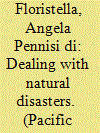

|
|
|
|
|
| Summary/Abstract |
Over the past two decades, natural disasters have severely hit the Southeast Asian region causing dramatic environmental, economic and social consequences. Through the lens of Beck's risk society framework and the theory of reflexive modernization, this article attempts at empirically taking stock of how the Association of Southeast Asian Nations (ASEAN) is addressing disaster risk through the creation of new regional institutions and mechanisms. In particular, it argues that the accumulation of the experience of catastrophes is leading ASEAN members towards the development of new precautionary initiatives to deal with disasters, and to forge a new way forward for the promotion of disaster cooperation and joint emergency response. The article is divided into five sections, which will only consider initiatives endorsed within the ASEAN framework. The first introduces risk societies as forms of modern societies and of the insecurities of the present world. In the second section attention is drawn to natural disasters as a paradigmatic example of Beck's risk society. The third section explores how ASEAN normative governance is evolving to include the issue of disaster management within its security and social agenda. Then the main institutional and operational innovations and tools through which ASEAN is preparing to deal with disaster risk are explored. Finally, the article suggests that despite ASEAN overall institutional innovations, the practice of cooperation still is effected by several factors, above all the lack of adequate resources and the difficulty of reconciling principles of solidarity with national sovereignty, which hinder ASEAN effectiveness in this area.
|
|
|
|
|
|
|
|
|
|
|
|
|
|
|
|
| 14 |
ID:
145380
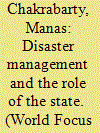

|
|
|
|
|
| Summary/Abstract |
Natural disasters hit at all in the society without any discrimination, rich and poor. But in reality, it is the poor who are the worst sufferers. One of the most important tasks before us is to introduce a culture of prevention in disaster managers and all communities at all levels. The culture must be disseminated so that all people in the society can become alert and become aware so that they can take some preventive measures in case of an emergency or before the disaster strikes. In this regard, early warning and conscious developmental planning are key elements to preventive planning regarding disaster. In India, now we experience a paradigm shift from post disaster response mechanism to pre disaster prevention, preparedness and mitigation strategy.
|
|
|
|
|
|
|
|
|
|
|
|
|
|
|
|
| 15 |
ID:
132486
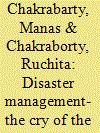

|
|
|
|
|
| Publication |
2014.
|
| Summary/Abstract |
One of the most crucial problems-with which mankind confronted with is de?nitely the ways and means of disaster management. In fact, mankind has survived and lived with natural disasters right from the days of the mythical universal deluge. (N arayan 2000). Many a times, mankind becomes simply a toy in the ands of the nature when it becomes furious due to ?ood or earthquake. Floods, volcanic eruptions and earthquakes have plagued and devastated humanity since time immemorial. (Narayan, 2000). The number" of natural disasters around the world continues to grow over time, and their impact on the stricken regions continues to be worsening. (Singh, 2000) In such situations, disaster management becomes really a major concern. Disaster management has assumed great importance of late, due to the occurrence of natural as well as manmade disasters. (Murthy, 2007).
|
|
|
|
|
|
|
|
|
|
|
|
|
|
|
|
| 16 |
ID:
160212
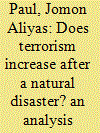

|
|
|
|
|
| Summary/Abstract |
Does an emergency such as a natural disaster lead to a surge of terrorism? This paper contributes to the emerging literature on this issue. We consider the experience of 129 countries during the period 1998–2012 to determine the effect of a natural disaster on both domestic as well as transnational terrorism. We also control for endogeneity using expenditure on health care and land area in a country as instruments. In contrast to the existing literature, we measure the extent of terrorism by the value of property damage. The results indicate that after natural disasters, (a) transnational terrorism increases with a lag, and (b) a statistically significant impact on domestic terrorism is not observed.
|
|
|
|
|
|
|
|
|
|
|
|
|
|
|
|
| 17 |
ID:
110812
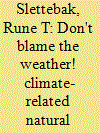

|
|
|
|
|
| Publication |
2012.
|
| Summary/Abstract |
The issue of climate change and security has received much attention in recent years. Still, the results from research on this topic are mixed and the academic community appears to be far from a consensus on how climate change is likely to affect stability and conflict risk in affected countries. This study focuses on how climate-related natural disasters such as storms, floods, and droughts have affected the risk of civil war in the past. The frequency of such disasters has risen sharply over the last decades, and the increase is expected to continue due to both climate change and demographic changes. Using multivariate methods, this study employs a global sample covering 1950 to the present in order to test whether adding climate-related natural disasters to a well-specified model on civil conflict can increase its explanatory power. The results indicate that this is the case, but that the relation is opposite to common perceptions: Countries that are affected by climate-related natural disasters face a lower risk of civil war. One worrying facet of the claims that environmental factors cause conflict is that they may contribute to directing attention away from more important conflict-promoting factors, such as poor governance and poverty. There is a serious risk of misguided policy to prevent civil conflict if the assumption that disasters have a significant effect on war is allowed to overshadow more important causes.
|
|
|
|
|
|
|
|
|
|
|
|
|
|
|
|
| 18 |
ID:
106549
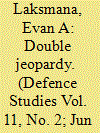

|
|
|
| 19 |
ID:
160789
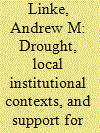

|
|
|
|
|
| Summary/Abstract |
We address two questions on the effects of climate change for social instability. First, do droughts and their associated environmental impacts affect support for the use of violence? Second, do local-level formal and informal institutions moderate support for violence when and where droughts worsen? To answer these questions, we conducted a national survey of 1,400 Kenyans in 2014. Respondents were asked about patterns of rainfall and the presence of rules regulating natural resource use and access. Survey data are joined to spatially disaggregated observed rainfall trends. The survey uses endorsement experiments to elicit honest responses about support for using violence. There is some evidence of a direct, though limited, link between observed drought and violent attitudes. Certain local-level natural resource use rules have moderating effects on support for violence where drought is reported and precipitation is less frequent. This conditional and contextual effect is an important modification of overly simplistic narratives of universal climate change effects.
|
|
|
|
|
|
|
|
|
|
|
|
|
|
|
|
| 20 |
ID:
175346
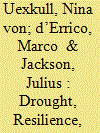

|
|
|
|
|
| Summary/Abstract |
The effects of climate variability and change on security are debated. While this topic has received considerable attention in both policy circles and academia, the microlevel pathways and conditions under which climatic shocks increase conflict risks are poorly understood. We suggest that household resilience provides one key to understanding these relationships. Using novel household survey data from two conflict-affected regions in Eastern Democratic Republic of the Congo, we study variation in the support for violence related to reported exposure to drought and resilience metrics. Using comprehensive multifaceted objective and subjective indicators of resilience, we find that less resilient respondents who report having experienced drought and associated losses are more likely to be supportive of the use of political violence. In contrast, our findings suggest that there is no general association between reporting drought exposure and support for violence.
|
|
|
|
|
|
|
|
|
|
|
|
|
|
|
|
|
|
|
|
|